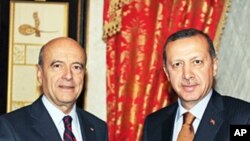As the West mulls more sanctions on Iran's disputed nuclear program, analysts say the success of the penalties could depend on Turkey's involvement. The diplomatic press for more sanctions will accelerate with the French foreign minister's visit to Ankara, which started Thursday.
Along with the deepening crisis in Syria, sanctions against Iran for its nuclear ambitions are expected to be key areas of discussion in French Foreign Minister Alain Juppe's meetings this week with the Turkish president and other officials.
World powers gathering at the United Nations nuclear watchdog meeting in Vienna Thursday expressed "deep and increasing concern" that Iran is using its nuclear program to develop military weapons. Iran maintains its program is peaceful.
Despite the denials by Tehran, Western pressure is growing for a new wave of tough economic sanctions against Iran. Iran watcher Mehrdad Emadi of the London-based consultancy firm Beta Matrix says the success of any new measures depends on Turkish cooperation, especially in policing Turkish trade with Iran.
"Regionally we could not overestimate the role Turkey can play in making sanctions more effective, more transparent, and prevent sanction-busting behavior by Turkish businesses and Turkish middlemen and Iranian business agents," said Emadi.
But Ankara has steadfastly refused to enforce European Union or U.S. measures against Iran, saying it is only bound by U.N. sanctions. Financial considerations put Turkey in a difficult diplomatic position, says international relations expert Soli Ozel of Kadir Has University.
"It's dependent on Iranian gas for 20 percent of its needs," said Ozel. "And it needs Iran in order to get its trucks through to Central Asia...But it will be hard pressed to resist the allies' pressure."
Turkish Prime Minister Recep Tayyip Erdogan has been a reluctant backer of sanctions, saying their impact hurts common folk most, rather than governments. But with Mr. Erdogan expected to soon announce Turkish sanctions against Syria over its deadly crackdown on government opposition, it appears Ankara is taking a place on the sanctions stage.
Murat Bilhan, an international relations expert at Kultur University, is a former head of the Turkish Foreign Ministry's department on strategic thinking. He says Turkey will be less resistant to Western overtures on sanctions if it is approached with respect.
"Turkey is not a country to be taken for granted," said Bilhan. "It should be consulted at each level. The problem in the past has been, Turkey has been taken for granted."
To that end, observers say diplomatic traffic to Ankara is expected to be intense in the coming days as the push to sanction Iran expands.
Turkey May Be Key to Expanding Western Sanctions Against Iran
- By Dorian Jones




